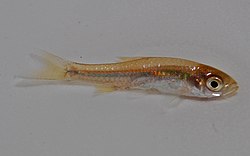| Silver rasbora | |
|---|---|
 | |
 | |
| Young adult above, juvenile below | |
| Scientific classification | |
| Kingdom: | Animalia |
| Phylum: | Chordata |
| Class: | Actinopterygii |
| Order: | Cypriniformes |
| Family: | Danionidae |
| Subfamily: | Rasborinae |
| Genus: | Rasbora |
| Species: | R. argyrotaenia |
| Binomial name | |
| Rasbora argyrotaenia | |
| Synonyms | |
| |
The silver rasbora (Rasbora argyrotaenia) is a species of ray-finned fish in the genus Rasbora . It occurs in the Mekong, Chao Phraya and Mae Klong basins, Malay Peninsula as well as Borneo, Java and Sumatra. [2]
